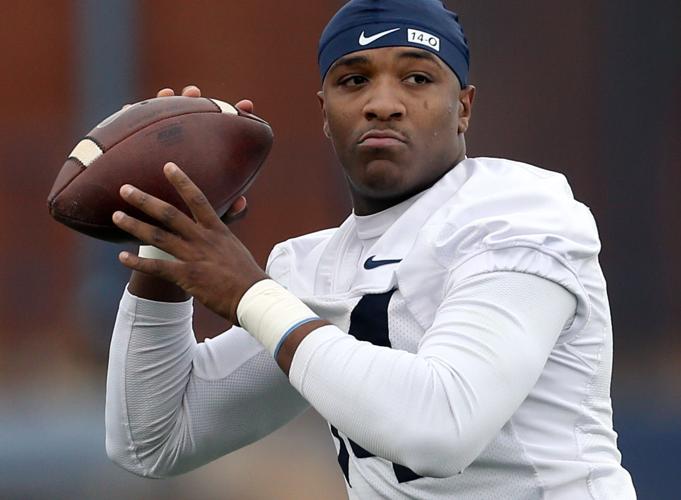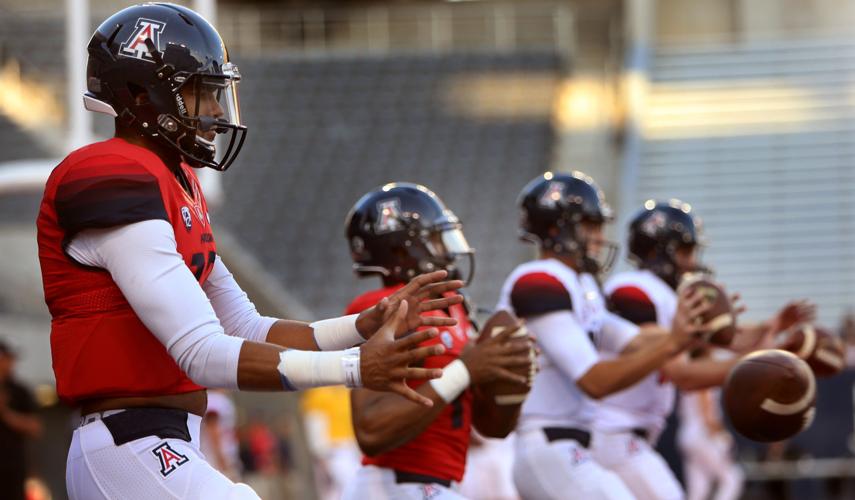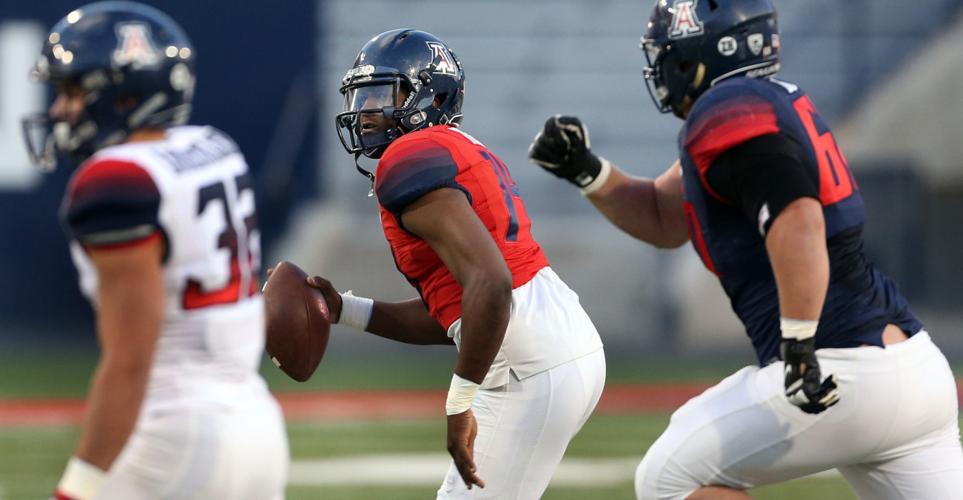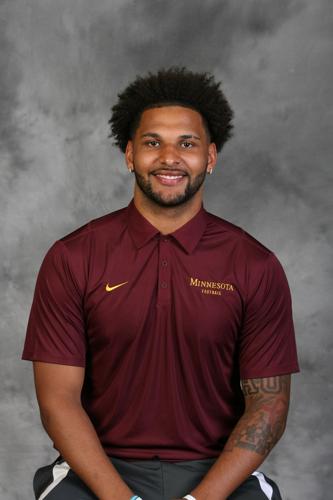The most important time for the Arizona Wildcats’ still-developing quarterbacks isn’t spring. It isn’t fall.
It’s what happens in between.
Coach Rich Rodriguez has mentioned it repeatedly: The quarterbacks need to step up their games in the summer, when the coaches, by NCAA rule, are not allowed to coach them.
Brandon Dawkins and Khalil Tate have heard the message loud and clear. They understand what’s expected of them.
“For a quarterback, there really is no offseason,” said Dawkins, who’s entering his redshirt junior season as the favorite to start. “Maybe you get a week or two. Two would be max. You’re never really taking that much time off from throwing, working out, something.”
The quarterbacks know they need to put in the work to improve a passing game that slumped badly last season. Arizona posted its fewest passing yards and touchdowns under Rodriguez. The offense, plagued by injuries at quarterback and tailback, often became one-dimensional.
The Wildcats spent 15 spring practices striving to upgrade the passing attack; it was the No. 1 item on their lengthy to-do list after a 3-9 season. But in Rodriguez’s view, that was just the start.
“You can’t play at an elite level, particularly at quarterback, if you’re not fully committed throughout the summer to work, not only on the physical part, but the mental part,” Rodriguez said. “I think they have (been). But there’s another level we’ve got to get to, and they’ve got to do it on their own without the coaches being there, without our direction.
“I think they want it. I feel good about those guys understanding what they need to do this summer.”
That might not have been the case in recent years.
After Arizona concluded spring practice on March 31, Rodriguez said: “I don’t think the last few summers they’ve been as aggressive working on their skills and their game as they need to be.”
Whether he was referring specifically to Dawkins, Tate (who enrolled at Arizona in January 2016) or the recently transferred Anu Solomon is not clear; what Rodriguez wants moving forward, though, is.
“I know those guys love football, but they’ve got to love the grind of getting ready in the summer on their own,” Rodriguez said. “I think they’ll do that.”
Every player at every position is expected to put in work during the offseason. Some of it is required, NCAA-approved weightlifting and conditioning. The other portion consists of voluntary, player-run practices, or PRPs. But if you want to get better — and get in the coaches’ good graces — you’d better show up.
“It’s optional,” junior receiver Shun Brown said, “but it’s mandatory at the same time.”
And it’s different for quarterbacks.
“It’s expected,” quarterbacks coach Rod Smith said. “When football time’s up, football time’s not up for them.”
Quarterbacks are tasked with organizing the PRPs, which usually run one hour per session four or five days per week. The invites to the other skill-position players — and/or defenders for 7-on-7 sessions — go out via group text. The PRPs — which coaches are not allowed to attend or even watch from afar — are wedged into players’ surprisingly busy summer schedules, which also include classes and the aforementioned conditioning workouts.
Now that he’s an upperclassman, Dawkins believes he has a better understanding of his role in leading those passing sessions. The quarterback essentially has to serve as the head coach and offensive coordinator. The actual coaches might provide guidelines, but it’s mostly up to Dawkins to determine what — and who — needs the most work.
“What don’t you guys understand?” Dawkins will ask his teammates. “What routes do you have trouble with? What routes are you still trying to work on?”
The PRPs serve a dual purpose. For veterans, it’s another opportunity to sharpen their skills. For young players and newcomers, it’s a chance to get up to speed — not only with the playbook, but with the work ethic that’s required to be competitive in Division I football.
Tate didn’t fully grasp the significance of summer workouts as a 17-year-old freshman last year.
“I didn’t realize it,” he said. “They’re very important. You have to get out there and perform hard at all times.”
Brown remembered arriving in Tucson from Shreveport, Louisiana, in the summer of 2015. He had little idea what any of the play calls meant. Veteran Nate Phillips helped him — to a point.
“After the fourth time asking him, he was like, ‘Nah, bro, you’ve gotta start learning by yourself,’” Brown said. “When he stopped helping me, that’s when I actually started learning.”
Now Brown is a vet, and new receivers such as Brian Casteel and Drew Dixon will learn from him.
Arizona also will welcome two new quarterbacks when summer classes begin: K’Hari Lane from Montezuma, Georgia, and Rhett Rodriguez, the coach’s son, from Catalina Foothills High School.
Rhett regularly observed Arizona’s spring practices while in high school and accompanied his father to the coaches’ offices afterward. Although in need of physical development, Rhett already possesses the mindset his dad believes all successful quarterbacks must have.
“That position, if you’re not a gym rat, I don’t think you can ever be as good as you need to be,” said Rich Rodriguez, who placed several of his past quarterbacks — including Pat White, Denard Robinson, Matt Scott and B.J. Denker — in that category. “The best quarterbacks at all levels are the ones that are truly obsessed with the game and everything about the game. That’s where we’ve got to get (the current) guys to.”
When training camp opens in August, Rodriguez and Smith said they’ll be able to tell immediately whether the quarterbacks and their teammates put in the work.
If the passes are crisp and the routes are sharp, the coaches will know what the Wildcats did last summer.







